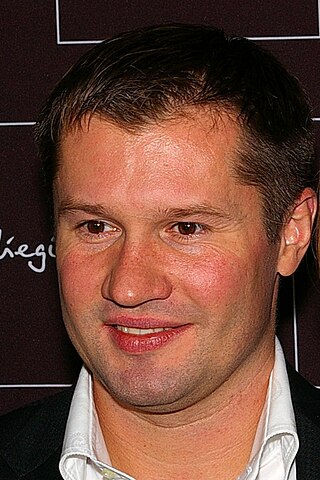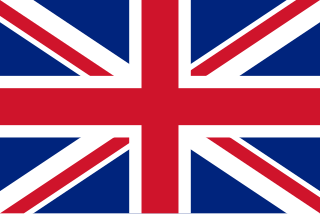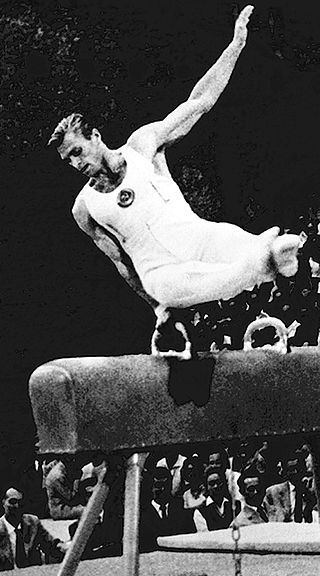Related Research Articles

The 1900 Summer Olympics, today officially known as the Games of the II Olympiad and also known as Paris 1900, were an international multi-sport event that took place in Paris, France, from 14 May to 28 October 1900. No opening or closing ceremonies were held.

Rhythmic gymnastics is a sport in which gymnasts perform individually or in groups on a floor with an apparatus: hoop, ball, clubs, ribbon and rope. The sport combines elements of gymnastics, dance and calisthenics; gymnasts must be strong, flexible, agile, dexterous and coordinated. Rhythmic gymnastics is governed by the International Gymnastics Federation (FIG), which first recognized it as a sport in 1963. At the international level, rhythmic gymnastics is a women-only sport.
At the 1900 Summer Olympics, seven of the archery events that took place in Paris, France, are considered to be "Olympic" by Olympic historians, with 153 archers competing. The identities of 17 of those archers are known, though a number of those are known only by their surnames.
A cricket match was played as part of the 1900 Summer Olympics, took place on 19–20 August at the Vélodrome de Vincennes between teams representing Great Britain and France.
At the 1900 Summer Olympics, an association football tournament was contested for the first time. Only two matches were held between the three club sides, and no medals were awarded.
The 1900 Summer Olympics took place in Paris, France. Two of the golf events that were contested in early October at the Compiègne Club, Compiègne as part of the Exposition Universelle, the men's and women's individual stroke play competitions, have since been afforded Olympic status. As such the 1900 games are recognised as the first time that golf was held in the Olympics.

At the 1900 Summer Olympics one gymnastics event for men was contested. The competition was held on Sunday, 29 July 1900, and on Monday, 30 July 1900. There were 135 competitors from 8 nations. The top 18 places were taken by French gymnasts, of which there were more than 100. The event was won by Gustave Sandras, with Noël Bas finishing second and Lucien Démanet third. The highest-placing foreign gymnast was Jules Ducret of Switzerland, in a tie for 19th place.

Alexei Yurievich Nemov is a former artistic gymnast from Russia. During his career, he won five world championships, three European championships and twelve Olympic medals.
The 1900 Summer Olympics were held in Paris, France, from May 14 to October 28, 1900, as part of the 1900 World's Fair.

The United Kingdom of Great Britain and Ireland competed as Great Britain at the 1900 Summer Olympics in Paris, France. It was the second appearance of Britain after having participated in the inaugural 1896 Games. In Olympic competition, the nation has always shortened its official name to Great Britain rather than the United Kingdom seen elsewhere.

Hungary first participated at the Olympic Games at the inaugural 1896 Games, and has sent athletes to compete in most Summer Olympic Games and every Winter Olympic Games since then. The nation was not invited to the 1920 Games for its role in World War I, and was part of the Soviet-led boycott of the 1984 Summer Olympics.

The modern Olympic Games were founded by French historian Pierre de Coubertin. France has competed in every edition, with the possible exception of the 1904 Games.

India first participated at the Olympic Games in 1900, becoming the first Asian nation to do so. Norman Pritchard represented the country and won two medals, both silver, in athletics. The nation first sent a team to the Summer Olympic Games in 1920 and has participated in every Summer Games since then. India has competed at several Winter Olympic Games after its debut in 1964.

Water polo has been part of the Summer Olympics program since the second games, in 1900. A women's water polo tournament was introduced for the 2000 Summer Olympics. Hungary has been the most successful country in men's tournament, while the United States is the only team to win multiple times at the women's tournament since its introduction. Italy was the first to win both the men's and women's water polo tournaments.

The men's individual all-around, also known as the heptathlon, was one of two gymnastics events on the Gymnastics at the 1908 Summer Olympics programme. As suggested by the alternate name, the competition included seven events with the scores summed to give a final score. Each nation could enter up to 20 gymnasts, with France and Great Britain each entering the maximum. A total of 97 gymnasts from 12 nations competed. The event was won by Alberto Braglia of Italy, the nation's first medal in the men's individual all-around. Silver went to Walter Tysall of Great Britain, the first medal for the nation as well. France's Louis Ségura earned bronze.

Sailing has been one of the Olympic sports since the Games of the I Olympiad, held in Athens, Greece, in 1896. Despite being scheduled in the first Olympic program, the races were canceled due to severe weather conditions. Apart from the 1904 Summer Olympics, sailing has been present in every edition of the Olympic Games.

The men's artistic individual all-around was an artistic gymnastics event held as part of the gymnastics at the 1920 Summer Olympics programme. It was the fifth appearance of the event. The competition was held on Wednesday, 25 August 1920. 25 gymnasts from seven nations competed. Nations had been limited to 6 gymnasts each since 1912. The event was won by Giorgio Zampori of Italy, the nation's third consecutive victory in the men's individual all-around. France's Marco Torrès took silver and Jean Gounot earned bronze, stretching the French podium streak to three Games as well.

The men's individual all-around competition was one of eight events for male competitors in artistic gymnastics at the 1980 Summer Olympics in Moscow. The qualification and final rounds took place on July 20, 22 and 24th at the Sports Palace of the Central Lenin Stadium. There were 65 competitors from 14 nations. Each nation could enter a team of 6 gymnasts or up to 3 individual gymnasts. The event was won by Alexander Dityatin of the Soviet Union, the nation's second consecutive and fifth overall victory in the event. It was the second of Dityatin's 8 total medals in 1980, a record that still stands through the 2016 Games. Dityatin's teammate, defending gold medalist Nikolai Andrianov, finished with the silver medal. Andrianov was the 10th man to win multiple medals in the event; he would also finish the 1980 Games with a total of 15 medals over all years—most among men at the time. Bronze went to Stoyan Deltchev of Bulgaria—the first medal in the event by a gymnast not from the Soviet Union or Japan since 1952. It was Bulgaria's first-ever medal in the men's all-around. Japan, which had joined the American-led 1980 Summer Olympics boycott and did not compete, had its six-Games podium streak ended.

Max Antony Whitlock is an English artistic gymnast. With fourteen medals and six titles in Olympic and World Championships, Whitlock is the most successful gymnast in British history. He is also the most successful pommel horse worker in Olympic Games history, with two gold medals and one bronze.

The men's artistic individual all-around competition at the 1960 Summer Olympics was held at the Baths of Caracalla from 5 to 7 September. It was the thirteenth appearance of the event. There were 130 competitors from 28 nations. Each nation entered a team of six gymnasts or up to two individual gymnasts. The event was won by Boris Shakhlin of the Soviet Union, the nation's third consecutive victory in the event, putting the Soviets second all-time to that point. Takashi Ono of Japan and Yuri Titov of the Soviet Union repeated as silver and bronze medalists, respectively; they were the fifth and sixth men to earn multiple medals in the event.
References
- ↑ Drevon, A. (2000). Les Jeux olympiques oubliés: Paris 1900 (in French). CNRS. p. 91. ISBN 978-2-271-05838-6 . Retrieved 2024-01-28.
- ↑ Rowbottom, Mike (2012-10-30). "Comprehensive Olympic data now back in public domain at olympedia.org". insidethegames.biz. Retrieved 2024-01-28.
- 1 2 "Olympedia – Military Exercise at the 1900 Summer Olympics". Olympedia – Main Page. 1900-06-25. Retrieved 2024-01-28.